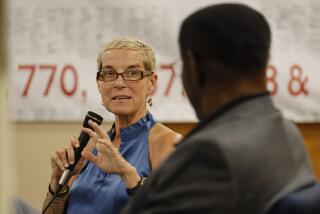Obituaries - May 8, 1999
- Share via
* Mae Bertha Carter; Her Children Desegregated Schools
Mae Bertha Carter, 76, a Mississippi mother of 13 who defied segregationists to send her children to all-white schools. Carter’s children were the first black students to attend white schools in Drew, Miss., after desegregation became law. They were teased or shunned, and shots were fired into their home. When the overseer of the plantation where the Carters sharecropped drove up and demanded that they return to black schools, Carter set up a phonograph on the porch to play a recording of a 1963 civil rights speech by President John F. Kennedy. The family eventually was run off their farm by angry whites. Nonetheless, Carter told her children never to hate anyone. “That is not a white school, that is your school,” she told them, according to Constance Curry, whose book, “Silver Rights,” chronicled their struggles during the civil rights movement. Carter was born on a plantation in Sunflower County, Miss., in 1923 and began picking cotton when she was 6. She was 7 when her uncle was shot in a field by a white mob and in her early 30s when civil rights worker Emmett Till was murdered. She later joined the National Assn. for the Advancement of Colored People and became an activist, helping to transport blacks to polling places. On April 28 of cancer in Drew.
* Tibor Kalman; Iconoclastic Graphic Designer
Tibor Kalman, 49, iconoclastic graphic designer. Kalman was the founder of M&Co;, a revolutionary New York design firm that prospered by needling its big corporate clients to be socially and politically conscious. He began his career styling windows for Barnes & Noble, eventually designing the distinctive shopping bags that became the signature of the global bookselling chain. In 1979 he started M&Co; in Manhattan and for the next decade sold “design by the pound” to department stores, banks and other establishments. In the mid-1980s he reinvented the design firm as a conceptually progressive studio promoting causes such as environmentalism and economic justice. He shook the conventions of the design community when he produced a record cover for the group Talking Heads that featured digitally manipulated photos of its members and a title with upside-down letters. He edited Colors, the Italian and English magazine published by the Italian clothing company Benetton, producing issues that focused on prickly topics such as AIDS. One issue devoted to racism used computer manipulations to show how icons like Queen Elizabeth and Arnold Schwarzenegger would look if they were black. Once he turned down a job shooting Burger King ads, saying that “if Burger King stopped existing, everybody would be healthier.” He sent clients Christmas cards with donation envelopes addressed to advocates of the homeless and gay men’s health clinics. “You can call us ‘politically correct’ if you like,” he said several years ago, “although I’d prefer to be thought of as ‘politically conscious.’ ” . In July, the San Francisco Museum of Modern Art will open “Tiborocity,” an exhibition of his work that the Budapest-born Kalman designed as a last testament. On May 2 near San Juan, Puerto Rico, after a four-year battle with non-Hodgkins lymphoma.
* Meredith Morgan; UC Berkeley Optometry School Dean
Meredith Morgan, 87, who guided UC Berkeley’s optometry program for many years. Known for his research into basic mechanisms of eye focusing and alignment, Morgan was a professor for 33 years and served as dean of the School of Optometry from 1960 to 1973. He remained supportive of the school in his retirement and wrote the first chapter in the recent book “Cal Optometry--The First 75 Years.” Morgan’s research into the elements of binocular vision resulted in two dozen papers laying out a basic understanding of how the eyes work together to focus and converge on objects at close range. He also contributed to textbooks on the vision of children and the elderly. On May 1 in Berkeley of lung cancer.
More to Read
The biggest entertainment stories
Get our big stories about Hollywood, film, television, music, arts, culture and more right in your inbox as soon as they publish.
You may occasionally receive promotional content from the Los Angeles Times.










